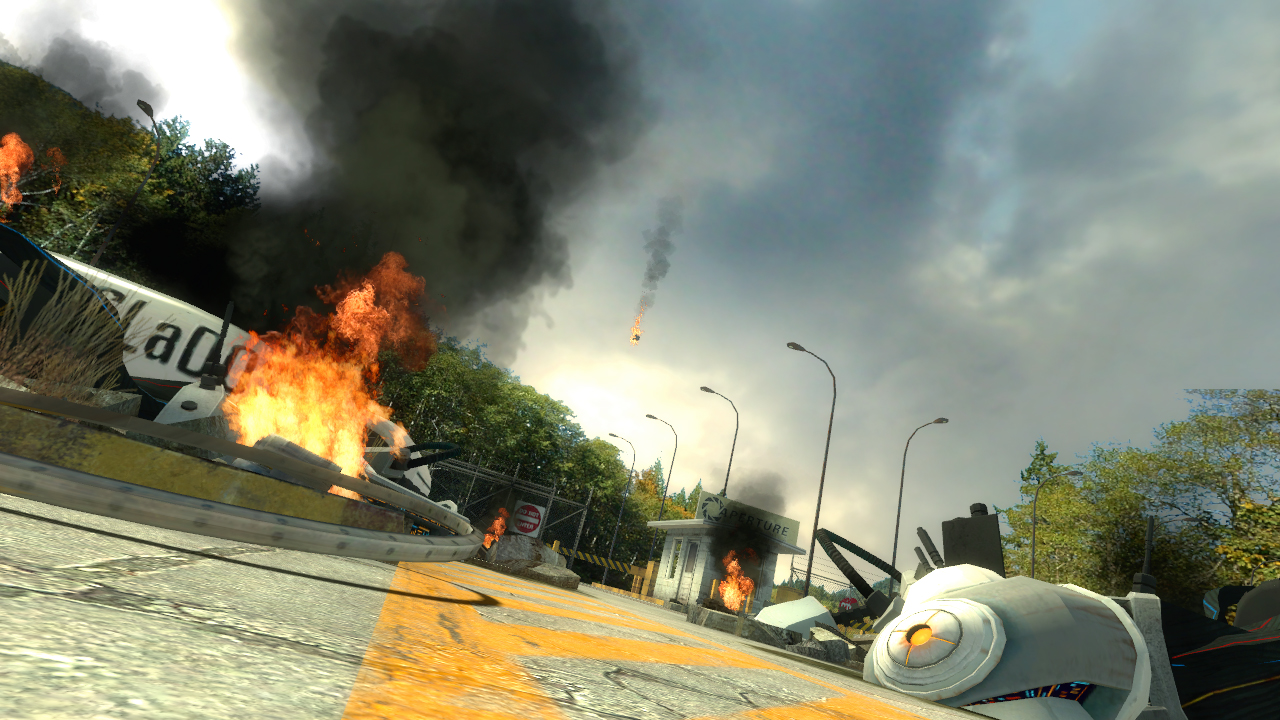STOP. SPOLIERZ. if you haven’t finished portal yet, don’t read this post. seriously though. the game is so much better unspoiled — to be experienced in a complete and utter daze as if you had just woken up in an isolated, empty research lab with only a computer voice to keep you company.
There is nothing more satisfying than throwing GLaDOS’s red, angry, crazy, spitting eye into the “Aperture Science Emergency Intelligence Incinerator” and being rewarded by your cake and a satisfyingly creepy song.
Up until 20 minutes ago, I had only ever played Portal 2 on my suite-mates ps3 on multiplayer — which for the record was an incredible amount of fun. But completing the series of puzzles solo (stranded in DC after a fantastic protest waiting for a freak mid-atlantic storm to pass), with only some base knowledge (‘the cake is a lie’, what portals are, some knowledge of what each of the images means) was a fantastic experience. Particularly walking through the story-line.
I completed this game in about 3-sit-down sessions of about 30-50 minutes each (total play time: 2 hours), so compared to the console games I am most familiar with a relatively short game. However, the story integration into what is for all intents and purposes a simple puzzle game is astounding. The main character, Chell (whose name is revealed in the games end-credits) begins in a practically infant-like state, alone in a sealed “relaxation vault.” As the player learns the mechanics and rules of the game they rely heavily on the instruction provided by GLaDOS and are unable to create their own portals. The game progresses and eventually Chell can shoot both orange and blue portals, allowing her to jump across space instantaneously through these portal gates (which you of course already knew, because you saw my spoiler warning at the top and did not continue reading, right?). So far, pretty normal, right? Totally. Then the story begins to develop. Just as the player is settling into the basic game-play: analyze the space, find the door, figure out what buttons to press and where to find the cube, you notice something. Weird rooms hidden behind platforms, strange writing on the walls, you begin to notice the human-like qualities of the turrets and GLaDOS seems to get cheekier. The pristine and clean facade of Apeture begins to fall away and you start to discover the rusty, abandoned subsurface.
 Before you know it, you’re careening into a fire pit and have to survive. And while the final levels are still just your same old portal puzzles, there is a greater sense of urgency. You aren’t an anonymous gun guessing your way through levels, you are Chell, fighting to survive.
Before you know it, you’re careening into a fire pit and have to survive. And while the final levels are still just your same old portal puzzles, there is a greater sense of urgency. You aren’t an anonymous gun guessing your way through levels, you are Chell, fighting to survive.

The story, which in itself is fantastically well crafted, from the strange maternal nature of GLaDOS to the games ability to get you to question your destruction of the turrets, is even further heightened by the game and sound design. The ambient sound emphasizes your alone-ness but also gives you an edge when fighting the turrets — a perfect combination of utility and ambiance. The puzzle nature of the game makes you think while also being designed in such a way that you feel immersed, like you are Chell, far more than your standard puzzler (bejeweled, minesweeper, even The Room).
Even though Portal is over 7 years-old, it is still a standard against which modern video-games should be compared. The engaging, immersive and interesting narrative and gameplay sets a precedent for future games.

Finally, the Enrichment Center reminds you that the Weighted Companion Cube will never threaten to stab you and, in fact, cannot speak.
